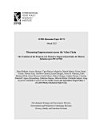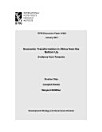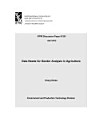The Abbreviated Women’s Empowerment in Agriculture Index (A-WEAI)
Meinzen-Dick, Ruth Suseela · Quisumbing, Agnes R. · Kovarik, Chiara · Sproule, Kathryn · Pinkstaff, Crossley · Malapit, Hazel J.
Jul 2017 · IFPRI Discussion Paper Book 1 · Intl Food Policy Res Inst
5.0star
1 reviewreport
Ebook
56
Pages
family_home
Eligible
info
reportRatings and reviews aren’t verified Learn More
About this ebook
The fifth Sustainable Development Goal—to “achieve gender equality and empower all women and girls”—reflects a growing consensus that these are key objectives of development policy in their own right, while also contributing to improved productivity and increased efficiency, especially in agriculture and food production. To deliver on this commitment to women’s empowerment in development calls for appropriate measures that can be used to diagnose the scope and major sources of disempowerment and to measure progress. The Women’s Empowerment in Agriculture Index (WEAI) is a survey-based tool codeveloped by the International Food Policy Research Institute (IFPRI), the Oxford Poverty and Human Development Initiative, and the U.S. Agency for International Development (USAID) (Alkire et al. 2013). The index was originally designed as a monitoring and evaluation tool for the U.S. government’s Feed the Future initiative to directly capture women’s empowerment and inclusion levels in the agricultural sector. Since its launch in February 2012, the WEAI has been implemented in the 19 Feed the Future focus countries. As with any new metric, pilot testing in a few selected countries with limited sample sizes is insufficient to demonstrate how the WEAI would perform when rolled out on a wider scale. Concerns expressed by users of the WEAI led to the creation of an abbreviated version—the A-WEAI. This paper begins by presenting a brief overview of the WEAI and its construction. It then proceeds to discuss (1) the background and motivation behind the creation of the A-WEAI; (2) the steps taken to develop the AWEAI— namely, cognitive testing and piloting of different modules, particularly those that were difficult to administer in the field; (3) analysis of the pilot data from Bangladesh and Uganda; (4) domain-specific comparisons of the different pilot versions; and (5) robustness checks and empowerment diagnostics from the A-WEAI as compared with the original WEAI. The paper concludes by summarizing the modifications to the original WEAI and discussing possibilities for further development of empowerment metrics based on the WEAI.
Ratings and reviews
5.0
1 review
Abu Saleh
- Flag inappropriate
- Show review history
March 14, 2022
Love dit
Rate this ebook
Tell us what you think.
Reading information
Smartphones and tablets
Install the Google Play Books app for Android and iPad/iPhone. It syncs automatically with your account and allows you to read online or offline wherever you are.
Laptops and computers
You can listen to audiobooks purchased on Google Play using your computer's web browser.
eReaders and other devices
To read on e-ink devices like Kobo eReaders, you'll need to download a file and transfer it to your device. Follow the detailed Help Center instructions to transfer the files to supported eReaders.










